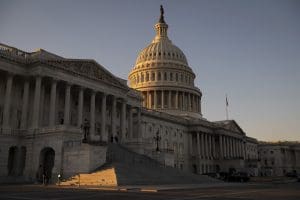258 congressional Republicans vote for catastrophic debt default
Just one GOP lawmaker joined the Democrats in voting to keep paying the federal government’s bills.

On Tuesday, Democrats in Congress voted to raise the debt limit — staving off what would have been a catastrophic and unprecedented default on the U.S. government’s outstanding debts — while 49 Republican senators and 209 Republican House members voted against the measure.
The measure, as passed, will raise the statutory cap on how much money the Treasury Department can borrow by $2.5 trillion. All 50 Senate Democrats voted for the increase on Tuesday afternoon, while every Republican present voted against it. In the House, which voted early Wednesday morning, only retiring Rep. Adam Kinzinger (R-IL) joined with 220 Democrats to pass the proposal, 221-209.
Democrats in Congress were able to pass the measure without a Republican filibuster, thanks to a one-time-only agreement made last week.
The debt ceiling limits what the federal government can borrow to pay for the spending already appropriated by Congress, along with the interest on the outstanding national debt. Republicans are responsible for a large share of that debt, including nearly $8 trillion added during former President Donald Trump’s time in the White House.
Without a debt limit increase, the United States would have hit its cap on Wednesday and would have been unable to pay its existing obligations.
Experts say such a default would have had a disastrous impact on the U.S. economy. Moody’s Analytics warned in September that “a default would be a catastrophic blow to the nascent economic recovery from the COVID-19 pandemic” that could cost 6 million jobs, reduce household wealth by $15 trillion, and do lasting damage to the country’s credit rating.
During the Trump administration, many Republicans supported bipartisan debt limit increases and even a temporary suspension of any limitation. But with President Joe Biden in office, the GOP minority flip-flopped and announced Democrats in Congress would have to pass all future debt ceiling increases on their own.
The vote “should be simple,” Rep. Don Beyer (D-VA), who chairs the Joint Economic Committee, told his colleagues on Tuesday.
“The United States must be a nation that pays its bills. Period,” Beyer added. “But instead of taking timely action, we wasted valuable time — time that should be focused on addressing the real problems facing our nation — and sowed uncertainty in the markets, just as our economy, fragile in the wake of the pandemic, is recovering.”
Some GOP lawmakers voted against the increase while admitting they supported its result.
“I voted against raising the debt limit,” tweeted Rep. Ashley Hinson (R-IA). “The U.S. should not default on our debts, but Congress cannot continue recklessly spending like there is no tomorrow.”
“Of course, America must borrow more rather than default, but no one should support more debt when there is no plan to repay it – ever,” Rep. Warren Davidson (R-OH) tweeted. “Don’t bankrupt America!”
Others suggested it was “irresponsible” of Democrats to act to avoid a catastrophic default.
“Raising the debt ceiling is one of the most irresponsible things that we as a Congress can do for the American people,” Rep. Lisa McClain (R-MI) tweeted.
“Voting no on raising the debt ceiling without structural reforms to deal with underlying problems was an easy decision,” Sen. Kevin Cramer (R-ND) tweeted. “Democrats’ spending is completely out-of-control and I will not be party to this reckless and irresponsible behavior.”
Once Biden signs the increase, it will likely allow the government to pay off all obligations until 2023.
Published with permission of The American Independent Foundation.
Recommended

Biden calls for expanded child tax credit, taxes on wealthy in $7.2 trillion budget plan
President Joe Biden released his budget request for the upcoming fiscal year Monday, calling on Congress to stick to the spending agreement brokered last year and to revamp tax laws so that the “wealthy pay their fair share.”
By Jennifer Shutt, States Newsroom - March 11, 2024
December jobs report: Wages up, hiring steady as job market ends year strong
Friday’s jobs data showed a strong, resilient U.S. labor market with wages outpacing inflation — welcome news for Americans hoping to have more purchasing power in 2024.
By Casey Quinlan - January 05, 2024
Biden’s infrastructure law is boosting Nevada’s economy. Sam Brown opposed it.
The Nevada Republican U.S. Senate hopeful also spoke out against a rail project projected to create thousands of union jobs
By Jesse Valentine - November 15, 2023








































































